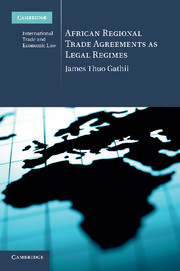Book contents
- Frontmatter
- Contents
- Figures
- Tables
- Acknowledgements
- Abbreviations
- Table of cases
- Introduction
- I African Regional Trade Agreements as Flexible Legal Regimes
- II Variable geometry: A defining aspect of African RTAs
- III Multiple memberships in African RTAs
- IV African RTAs in the context of Article XXIV of the GATT
- V Trade liberalization commitments and realization time frames
- VI Financing African RTAs
- VII African RTA Judiciaries
- VIII Trade remedy regimes
- IX Monetary unions in Africa
- X Intra-African regional trade integration
- XI African RTA relations with non-African RTAs
- Bibliography
- Index
- References
XI - African RTA relations with non-African RTAs
Published online by Cambridge University Press: 05 July 2011
- Frontmatter
- Contents
- Figures
- Tables
- Acknowledgements
- Abbreviations
- Table of cases
- Introduction
- I African Regional Trade Agreements as Flexible Legal Regimes
- II Variable geometry: A defining aspect of African RTAs
- III Multiple memberships in African RTAs
- IV African RTAs in the context of Article XXIV of the GATT
- V Trade liberalization commitments and realization time frames
- VI Financing African RTAs
- VII African RTA Judiciaries
- VIII Trade remedy regimes
- IX Monetary unions in Africa
- X Intra-African regional trade integration
- XI African RTA relations with non-African RTAs
- Bibliography
- Index
- References
Summary
Introduction
This chapter examines trade agreements between African regional trade areas and non-African trade areas. Some agreements are not finalized yet. Examples of agreement that are yet to be finalized include Economic Partnership Agreements between various African countries, either individually or as members of a regional group, on the one hand, and the European Union, on the other. In addition, there are free trade agreements (FTAgs) being negotiated between African regional groups like the East African Community, on the one hand, and the United States, on the other. Several agreements have been finalized and these will be discussed. There are several bilateral treaties, including those relating to investment signed between individual African countries and their non-African trading partners, including China and certain Latin American countries, among others. The goal of this chapter is to provide a sense of the types of trade agreements African regions have entered into or are entering into with their non-African trading partners. As the chapter shows, a common feature of these is that they often embody trade commitments in areas such as services and investment measures which are traditionally not areas in which intra-African trade agreements, until recently, have been concerned about. In addition, many of the agreements such as the Economic Partnership Agreements are moving away from preferential measures towards full reciprocity. Perhaps as an extreme example, some of the agreements now incorporate WTO-Plus obligations. The best example of this is the US–Morocco FTAg under which Morocco agreed to extremely broad protections of intellectual property rights beyond those it has committed itself under the TRIPS Agreement. An example of such a WTO-Plus protection includes data exclusivity protection that prevents generic competitors from using clinical trial data. Another example is the prohibition of registration of competing generics prior to the expiry of the period of patent protection.
- Type
- Chapter
- Information
- African Regional Trade Agreements as Legal Regimes , pp. 390 - 423Publisher: Cambridge University PressPrint publication year: 2011



